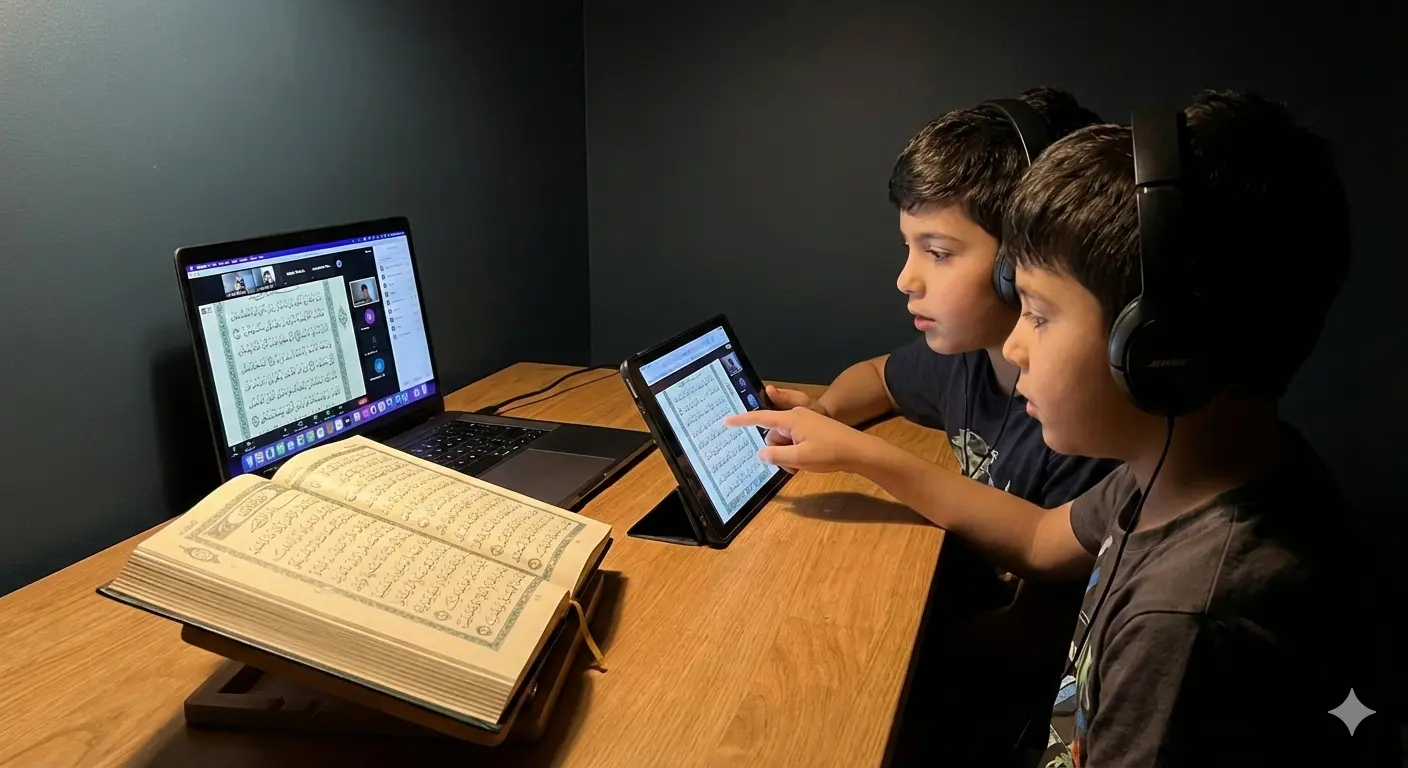
Empowering Non-Arabs to Connect with the Holy Quran
Buruj Academy was founded by Ammar Elhusinni, an Al-Azhar graduate with twelve years teaching Quran, Tajweed, and Arabic to English speakers across five continents.
Buruj Academy connects English-speaking students with Al-Azhar-certified Quran teachers and Arabic instructors who understand exactly where non-native speakers struggle. Most students don't struggle because the Quran or Arabic is difficult—they struggle because their teacher can't really explain why ض sounds different from ظ, or why Qalqalah happens where it does. Every Buruj Academy’s teacher passes multi-stage interviews testing Tajweed precision, Islamic knowledge, Arabic mastery, and English fluency. Then they're trained in the Buruj Method. This is online Quran education and online Arabic education built for English speakers at every age.

Buruj Academy was founded by Ammar Elhusinni, an Al-Azhar graduate with twelve years teaching Quran, Tajweed, and Arabic to English speakers across five continents.
At Buruj Academy, Ijazah-certified teachers use the Buruj Method to train your ear before teaching rules, offering personalized learning plans tailored to every student’s age, level, and goals.
Buruj Academy's instructors hold Ijazah certification and have passed rigorous screening for both Islamic knowledge and ability to teach non-Arabic speakers clearly and patiently.
Students hear the difference between ح and هـ twenty times at least before naming it. Rules are taught after the ear is trained, not before.
Every student receives a custom roadmap based on age, starting level, learning style, goals, and environment. A child learns differently than an adult revert.
Buruj Academy offers Quran and Arabic courses designed specifically for English-speaking students at every level, from complete beginners to advanced Islamic studies learners.
Buruj Academy's Quranic Arabic Teachers bring Al-Azhar-level expertise to English speakers learning the language of the Quran online. These instructors don't just teach vocabulary—they help students connect Arabic grammar to Quranic meaning,
View Course DetailsBuruj Academy connects English-speaking students with highly qualified Arabic teachers who combine native-level fluency, deep grammatical expertise, and proven teaching methods designed specifically for non-native
View Course DetailsBuruj Academy's Ijazah Certified Quran Teachers bring authenticated Quranic transmission to English-speaking students worldwide through rigorous certification and specialized training.
View Course DetailsBuruj Academy's online Tajweed teachers bring Al-Azhar-level expertise directly to English-speaking students worldwide, combining rigorous Makharij training with fluency in explaining Islamic concepts clearly.
View Course DetailsBuruj Academy's Hifz teachers combine rigorous Quran memorization expertise with specialized training in retention techniques for English-speaking students. Our Hifz teachers hold Ijazah certifications and understand the distinct cognitive patterns of learners memorizing in a second language.
View Course DetailsBuruj Academy pairs children aged 4–12 with child-friendly Quran teachers for kids who specialize in early Islamic education.
View Course DetailsLearn from qualified native Arab scholars with years of teaching experience
Qur’an & Tajweed Teacher for Non-Native Speakers
Al-Azhar Graduate | 16+ years Al-Azhar education | 1,400+ teaching hours | Teaching ages 4+
Qur’an Tutor | Multiple Ijazah Holder | Special Needs Specialist
4,500+ Teaching Hours | Ijazah in Hafs, Ibn ‘Amer & Abu ‘Amr | Teaching Arabs & Non-Native Speakers | 7+ Years Experience
Qur’an, Arabic & English Teacher
2,600+ teaching hours | Teaching Qur’an & Tajweed simply | Arabic & English Instructor | Kids & Adults
Qur’an, Arabic & Islamic Studies Teacher for Non-Native Speakers
Hafidhah | Languages Graduate with Honors | 1,000+ teaching hours | Teaching Kids (6+), Teens & Women
Qur’an & Arabic Teacher for Non-Native Speakers
3 years experience | Ijazah in Hafs, Shu‘bah & Warsh | 2,500+ teaching hours | Tajweed & Arabic Foundations
Qur’an & Islamic Studies Teacher for Non-Native Speakers
4+ years experience | 1,500+ teaching hours | Tajweed & Qur’an Instructor | Kids & Adults
Arabic & Qur’an Teacher for Non-Native Speakers
Al-Azhar Graduate | Educational Diploma | Teaching Arabic, Tajweed & Noor Al-Bayan for Kids and Adults
Qur’an & Tajweed Teacher
Memorized 26 Juz’ | 400+ teaching hours | Noor Al-Bayan & Tajweed Specialist | Interactive Lessons
Buruj Academy leads in structured, personalized Quran and Arabic education because teacher quality, teaching method, and student support are non-negotiable—not marketing slogans.
Buruj Academy interviews teachers for Arabic mastery, Tajweed accuracy, English fluency, and cultural awareness. Only instructors who pass all stages are trained in the Buruj Method.
Muslim sisters learn with Ijazah-certified female instructors in a judgment-free, modesty-conscious environment designed around their needs and schedules.
Children receive gamified lessons with short attention spans in mind. Adults receive logic-based explanations and faster material pacing. Heritage speakers skip alphabet drills entirely.
Buruj Academy's Hifz teachers don't rush students through long Surahs. They teach ten-minute daily habits, review cycles, and retention techniques that sustain memorization over years.
Pre-recorded videos can't isolate your pronunciation mistakes and slow them down in real time. Buruj Academy's online Tajweed teachers can.
Buruj Academy operates entirely online, eliminating facility overhead. Students receive Al-Azhar-credentialed Quran instruction at competitive rates with transparent pricing and no hidden fees.
Real transformations from students who mastered the Quran with our courses




Whether you’re a complete beginner, an adult revert, a child starting Arabic Alphabet, Noorani Qaida, or an advanced student refining Tajweed, Buruj Academy’s instructors are trained to guide you.
Buruj Academy serves English-speaking students worldwide through live online Quran classes. Instructors are available across time zones to accommodate students in North America, Europe, Australia, and beyond.
Buruj Academy serves students throughout North America with Quran teachers available across all time zones. Whether in California, Texas, Ontario, or Quebec, students book morning, afternoon, or evening lessons.
Buruj Academy’s North American students include working professionals, homeschooling families, university students, and new Muslims seeking qualified Quran instruction unavailable in their local communities. Flexible scheduling accommodates diverse needs.
Buruj Academy provides online Quran education to students across the UK, Germany, France, Netherlands, Sweden, and throughout Europe. English-speaking Muslims access Al-Azhar-certified teachers regardless of geographic location.
European students benefit from evening lesson availability that fits after-school schedules for children and post-work schedules for adults. Buruj Academy’s instructors understand the unique environment of learning Quran as a minority in non-Muslim-majority countries.
Buruj Academy’s global instructor network includes teachers available during Australian and Asian time zones. Students in Sydney, Melbourne, Singapore, and throughout the region access qualified Quran instruction.
Distance from traditional Islamic learning centers no longer prevents access to expert Tajweed instruction. Buruj Academy bridges the gap with live one-on-one lessons adapted to each student’s learning profile and schedule.
Real feedback from our amazing community of learners

Buruj Academy’s Ijazah-certified instructors are ready to work with you or your child. Book a free trial and experience the Buruj Method firsthand.
Students and parents often ask about Buruj Academy's teaching approach, instructor qualifications, pricing, and lesson structure. These answers clarify what to expect.